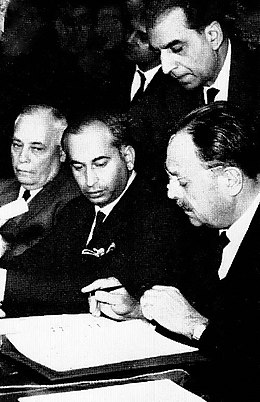Aziz Ahmed
| Aziz Ahmed | |
|---|---|

Aziz Ahmed (back, leaning over) watched Ayub Khan signing the Tashkent Agreement.
|
|
| 12th Minister of Foreign Affairs | |
|
In office 30 March 1977 – 5 July 1977 |
|
| President | Fzal Illahi Chaudhrie |
| Prime Minister | Zulfikar Ali Bhutto |
| Preceded by | Zulfikar Ali Bhutto |
| Succeeded by | Agha Schahi |
| 1st Minister of State for Foreign Affairs | |
|
In office 7 February 1973 – 28 March 1977 |
|
| President | Fzal Illahi Chaudhrie |
| Prime Minister | Zulfikar Ali Bhutto |
| Preceded by | Office created |
| Succeeded by | Zain Nouranie |
| 8th Foreign Secretary of Pakistan | |
|
In office 26 July 1963 – 23 June 1966 |
|
| President | FM Ayub Khan |
| Preceded by | Shekar Kandian Dehlavi |
| Succeeded by | AM S.M. Yusuf |
| 5th Pakistan Ambassador to the United States | |
|
In office 23 March 1959 – 26 July 1963 |
|
| President | FM Ayub Khan |
| Preceded by | M. Ali Bograh |
| Succeeded by | Ghulam Ahmed |
| Personal details | |
| Born |
Aziz Ahmed 1906 Amritsar, British Punjab Province |
| Died | 1982 Islamabad, Pakistan |
| Resting place | Islamabad Capital Cemetery |
| Citizenship |
British Subject (1906–1947) Pakistan (1947–1982) |
| Alma mater |
Government College, Lahore University of Cambridge |
| Cabinet | Zulfikar Ali Bhutto Government |
Aziz Ahmed, (Urdu: عزیز احمد; born 1906 – died 1982), HPk, was a career Pakistani statesman and the diplomat during the Cold war, serving in the capacity as 12th Foreign Minister of Pakistan from 1973 until 1977. Prior to that, Ahmad served as the Pakistan Ambassador to the United States (1959–63) and eventually appointed as Foreign secretary (1960–67) by President Ayub Khan.
He initially gained national prominence when he served as the Foreign secretary under then-Foreign Minister Zulfikar Ali Bhutto and opted for retirement in the opposition of Tashkent Agreement, signed by Ayub Khan to maintain and hold ceasefire with India in 1965. After the general elections in 1970 and the subsequent war with India in 1971, Ahmad was appointed as the Foreign minister of Pakistan until being terminated by President Muhammad Zia-ul-Haq after issuing criticism against the military coup d'état in 1977. Upon retirement from the Foreign Service, Ahmed lived a quiet life in Islamabad and died in 1982.
...
Wikipedia
